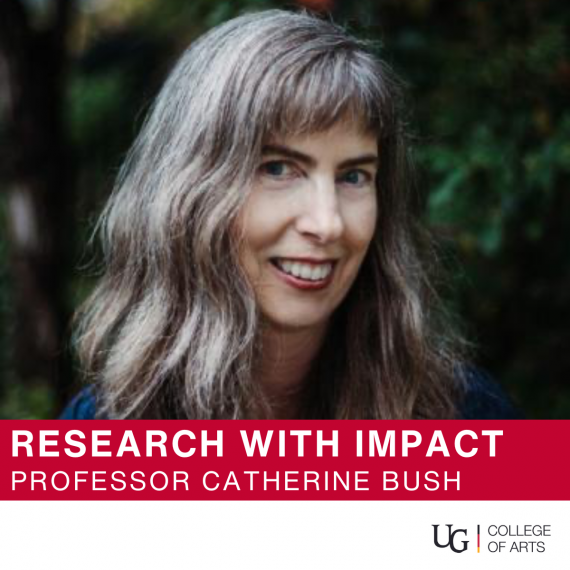Creative Writing Prof. Inspires Action Through Climate Crisis Writing

Catherine Bush is an associate professor of Creative Writing in the School of English and Theatre Studies in the College of Arts at the University of Guelph. For the past two years, she has principally taught in the College’s Undergraduate Creative Writing Minor as well as in its new Creative Writing Major and she was the coordinator of the University of Guelph’s Creative Writing Master of Fine Arts for 14 years. During an interview with the College of Arts’ Marketing and Communications team, Bush discussed her unique approaches to drawing attention to critical ecological and environmental issues in her research, writing, and teaching.
Bush explained that she is a writer in multiple genres, predominantly fiction and primarily a novelist. She shared that her research as a creative writer is highly experiential. “I need to go out into the world I’m writing about...I need to use all my senses. Not just to look but listen and touch the world.” Bush’s most recent novel, Blaze Island, which was named a Globe & Mail Best Book in 2020 and was selected by Hamilton Reads in 2021, demonstrates her experiential research approach and her respect for the environment while bringing the climate crisis to the forefront. “[Blaze Island] explores how we're grappling with the climate emergency, how we confront it, or fail to, within families and intergenerationally, and how we can bring new kinds of attention to the world, particularly the natural world around us. I was interested in heightening the novel's non-human elements. Usually in a novel, humans take up all the space. I wanted to shift that perspective and have the wind, the sky, the land, the animals, the birds, be powerful presences,” she explained.
In addition to conceptualizing and executing effective ways to address environmental issues through creative writing, Bush explained that she makes great efforts to introduce climate issues in her teaching in ways that shift the narrative of these issues from a dystopic one to one that invites the possibility of change, heightens students’ awareness of their capacity for change, and encourages them to engage with the world around them through experiential learning. In the second-year creative nonfiction course, Writing Nature, that she teaches, she mentioned students “have encounters with rehabilitated raptors from the Wild Ontario program based in the department of Integrative Biology [and] visit the Bovey Greenhouse and the Arboretum.” She explained that she is interested in promoting these kinds of connections that span disciplines across the University, in particular, interrelationships between creative writing and environmental sciences, and shared her plans to conduct conference presentations on some of these initiatives this summer. She also shared that she has written a chapter, "The Climate Crisis in the Creative Writing Classroom," in Teaching Creative Writing in Canada, a forthcoming Routledge anthology. This publication will disseminate Bush’s expertise and strategies for imparting knowledge about critical environmental issues in an impactful and resonating manner.
In the context of encouraging ecological dialogue across different disciplines, Bush shared that she is an affiliate member of the Guelph Institute of Environmental Research [GIER] and reflected on an online project she created as a member of the GIER entitled Imagining Climates. “[This project] brought together writers and scientists to respond to the climate crisis through writing and inter-disciplinary dialogue,” she recalled. Bush also mentioned that she is involved in another GIER project which focuses on how climate narratives are created in different disciplines and determines which climate narratives should be told. She noted that, additionally, she has created a module on Climate Storytelling for a trans-disciplinary, multi-unit online course available to students across the province, which was a collaboration between faculty at McMaster University and the University of Guelph.
Furthering her work to drive cross-disciplinary conversations about ecological issues, Bush is currently installed as a Landhaus Fellow at the Rachel Carson Center for Environment and Society at the University of Munich, an opportunity for which she was selected through a two-tiered international competition. She noted that 10 scholars working in the Environmental Humanities are participating in the program and explained that “part of the idea is that we create a cross-pollinating conversation between our disciplines.” Bush shared that, as the program’s inaugural Writer-in-Residence, she will be working on a new novel that draws on the life of American environmentalist Rachel Carson and teaching a series of workshops as part of the Carson Center’s Environmental Writing Studio.
Bush believes that writers and human beings “need to hone deep attention and acknowledge our place in an ecology of interconnectedness both with other humans and other life forms.” Next year, she will publish a collection of short stories which further this ideology, exploring humankind’s place in our world and the co-existence of and interactions between humans and the environment.